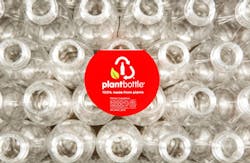The company said that it wanted to develop a more sustainable, plant-based alternative to packaging traditionally made from fossil fuels and other non-renewable materials.
The company has been manufacturing plant-based bottles since 2009, but at present the plastic contains only 30 percent plant-based materials.
The new PlantBottle packaging uses patented technology developed by biochemicals and biofuels company Virent that converts natural sugars found in plants into the ingredients for making PET plastic bottles. Virent converts sugarcane and waste from the sugarcane manufacturing process into BioFormPX paraxylene at its demonstration plant in Madison, Wisconsin.
Virent and Coca-Cola worked with Taiwan-based Far Eastern New Century to convert BioFormPX to bio-PET resin.
According to Coca-Cola, the packaging looks, functions and recycles like traditional PET but has a lighter carbon footprint. It can be used to make a variety of packaging sizes, and for water, sparkling, juice and tea beverage brands.
Virent and Coca-Cola have been working together since 2011. The beverage company made an additional investment in 2014 in order to support an expansion of Virent’s demonstration plant and help scale-up the separation and purification steps of the production process to produce larger quantities of bio-based paraxylene.
Coca-Cola has already produced more than 35 billion bottles that are 30 percent plant-based. The company hopes to launch commercial production of the 100 percent plant-based bottles by 2020.
